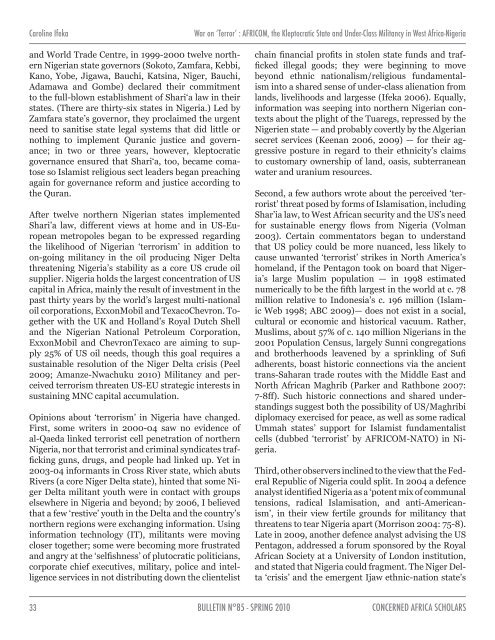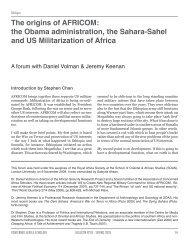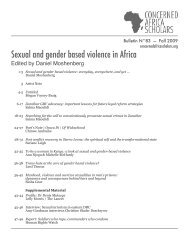Western Sahara and the United States' geographical imaginings
Western Sahara and the United States' geographical imaginings
Western Sahara and the United States' geographical imaginings
You also want an ePaper? Increase the reach of your titles
YUMPU automatically turns print PDFs into web optimized ePapers that Google loves.
Caroline Ifeka War on ‘Terror’ : AFRICOM, <strong>the</strong> Kleptocratic State <strong>and</strong> Under-Class Militancy in West Africa-Nigeria<br />
<strong>and</strong> World Trade Centre, in 1999-2000 twelve nor<strong>the</strong>rn<br />
Nigerian state governors (Sokoto, Zamfara, Kebbi,<br />
Kano, Yobe, Jigawa, Bauchi, Katsina, Niger, Bauchi,<br />
Adamawa <strong>and</strong> Gombe) declared <strong>the</strong>ir commitment<br />
to <strong>the</strong> full-blown establishment of Shari‘a law in <strong>the</strong>ir<br />
states. (There are thirty-six states in Nigeria.) Led by<br />
Zamfara state’s governor, <strong>the</strong>y proclaimed <strong>the</strong> urgent<br />
need to sanitise state legal systems that did little or<br />
nothing to implement Quranic justice <strong>and</strong> governance;<br />
in two or three years, however, kleptocratic<br />
governance ensured that Shari‘a, too, became comatose<br />
so Islamist religious sect leaders began preaching<br />
again for governance reform <strong>and</strong> justice according to<br />
<strong>the</strong> Quran.<br />
After twelve nor<strong>the</strong>rn Nigerian states implemented<br />
Shari’a law, different views at home <strong>and</strong> in US-European<br />
metropoles began to be expressed regarding<br />
<strong>the</strong> likelihood of Nigerian ‘terrorism’ in addition to<br />
on-going militancy in <strong>the</strong> oil producing Niger Delta<br />
threatening Nigeria’s stability as a core US crude oil<br />
supplier. Nigeria holds <strong>the</strong> largest concentration of US<br />
capital in Africa, mainly <strong>the</strong> result of investment in <strong>the</strong><br />
past thirty years by <strong>the</strong> world’s largest multi-national<br />
oil corporations, ExxonMobil <strong>and</strong> TexacoChevron. Toge<strong>the</strong>r<br />
with <strong>the</strong> UK <strong>and</strong> Holl<strong>and</strong>’s Royal Dutch Shell<br />
<strong>and</strong> <strong>the</strong> Nigerian National Petroleum Corporation,<br />
ExxonMobil <strong>and</strong> ChevronTexaco are aiming to supply<br />
25% of US oil needs, though this goal requires a<br />
sustainable resolution of <strong>the</strong> Niger Delta crisis (Peel<br />
2009; Amanze-Nwachuku 2010) Militancy <strong>and</strong> perceived<br />
terrorism threaten US-EU strategic interests in<br />
sustaining MNC capital accumulation.<br />
Opinions about ‘terrorism’ in Nigeria have changed.<br />
First, some writers in 2000-04 saw no evidence of<br />
al-Qaeda linked terrorist cell penetration of nor<strong>the</strong>rn<br />
Nigeria, nor that terrorist <strong>and</strong> criminal syndicates trafficking<br />
guns, drugs, <strong>and</strong> people had linked up. Yet in<br />
2003-04 informants in Cross River state, which abuts<br />
Rivers (a core Niger Delta state), hinted that some Niger<br />
Delta militant youth were in contact with groups<br />
elsewhere in Nigeria <strong>and</strong> beyond; by 2006, I believed<br />
that a few ‘restive’ youth in <strong>the</strong> Delta <strong>and</strong> <strong>the</strong> country’s<br />
nor<strong>the</strong>rn regions were exchanging information. Using<br />
information technology (IT), militants were moving<br />
closer toge<strong>the</strong>r; some were becoming more frustrated<br />
<strong>and</strong> angry at <strong>the</strong> ‘selfishness’ of plutocratic politicians,<br />
corporate chief executives, military, police <strong>and</strong> intelligence<br />
services in not distributing down <strong>the</strong> clientelist<br />
BULLETIN N°85 - SPRING 2010<br />
chain financial profits in stolen state funds <strong>and</strong> trafficked<br />
illegal goods; <strong>the</strong>y were beginning to move<br />
beyond ethnic nationalism/religious fundamentalism<br />
into a shared sense of under-class alienation from<br />
l<strong>and</strong>s, livelihoods <strong>and</strong> largesse (Ifeka 2006). Equally,<br />
information was seeping into nor<strong>the</strong>rn Nigerian contexts<br />
about <strong>the</strong> plight of <strong>the</strong> Tuaregs, repressed by <strong>the</strong><br />
Nigerien state — <strong>and</strong> probably covertly by <strong>the</strong> Algerian<br />
secret services (Keenan 2006, 2009) — for <strong>the</strong>ir aggressive<br />
posture in regard to <strong>the</strong>ir ethnicity’s claims<br />
to customary ownership of l<strong>and</strong>, oasis, subterranean<br />
water <strong>and</strong> uranium resources.<br />
Second, a few authors wrote about <strong>the</strong> perceived ‘terrorist’<br />
threat posed by forms of Islamisation, including<br />
Shar’ia law, to West African security <strong>and</strong> <strong>the</strong> US’s need<br />
for sustainable energy flows from Nigeria (Volman<br />
2003). Certain commentators began to underst<strong>and</strong><br />
that US policy could be more nuanced, less likely to<br />
cause unwanted ‘terrorist’ strikes in North America’s<br />
homel<strong>and</strong>, if <strong>the</strong> Pentagon took on board that Nigeria’s<br />
large Muslim population — in 1998 estimated<br />
numerically to be <strong>the</strong> fifth largest in <strong>the</strong> world at c. 78<br />
million relative to Indonesia’s c. 196 million (Islamic<br />
Web 1998; ABC 2009)— does not exist in a social,<br />
cultural or economic <strong>and</strong> historical vacuum. Ra<strong>the</strong>r,<br />
Muslims, about 57% of c. 140 million Nigerians in <strong>the</strong><br />
2001 Population Census, largely Sunni congregations<br />
<strong>and</strong> bro<strong>the</strong>rhoods leavened by a sprinkling of Sufi<br />
adherents, boast historic connections via <strong>the</strong> ancient<br />
trans-<strong>Sahara</strong>n trade routes with <strong>the</strong> Middle East <strong>and</strong><br />
North African Maghrib (Parker <strong>and</strong> Rathbone 2007:<br />
7-8ff). Such historic connections <strong>and</strong> shared underst<strong>and</strong>ings<br />
suggest both <strong>the</strong> possibility of US/Maghribi<br />
diplomacy exercised for peace, as well as some radical<br />
Ummah states’ support for Islamist fundamentalist<br />
cells (dubbed ‘terrorist’ by AFRICOM-NATO) in Nigeria.<br />
Third, o<strong>the</strong>r observers inclined to <strong>the</strong> view that <strong>the</strong> Federal<br />
Republic of Nigeria could split. In 2004 a defence<br />
analyst identified Nigeria as a ‘potent mix of communal<br />
tensions, radical Islamisation, <strong>and</strong> anti-Americanism’,<br />
in <strong>the</strong>ir view fertile grounds for militancy that<br />
threatens to tear Nigeria apart (Morrison 2004: 75-8).<br />
Late in 2009, ano<strong>the</strong>r defence analyst advising <strong>the</strong> US<br />
Pentagon, addressed a forum sponsored by <strong>the</strong> Royal<br />
African Society at a University of London institution,<br />
<strong>and</strong> stated that Nigeria could fragment. The Niger Delta<br />
‘crisis’ <strong>and</strong> <strong>the</strong> emergent Ijaw ethnic-nation state’s<br />
CONCERNED AFRICA SCHOLARS




